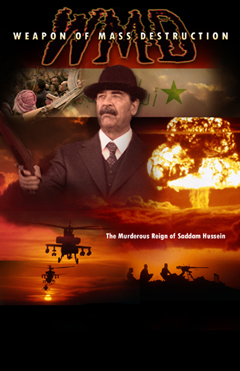At the beginning of WMD: Weapons of Mass Destruction - The Murderous Reign of Saddam Hussein (whew!), filmmaker Brad L. Maaske remarks that with all these political documentaries coming out in theaters and on video, nobody seemed to have the same views that he did (i.e. conservative). WMD is his answer. He wanted to ensure that he was able to get what he felt was the truth out. Maaske is not a filmmaker, and it shows. He makes the unfortunate decision to narrate the documentary, giving it a very amateurish feel. Maaske seems like a smart, nice guy, but he is not a great speaker. His narration takes away some of the very powerful images that he does use in the film.
For a film with the title WMD, there is sure a lot of filler. There are roughly three parts of the film, with each one less compelling than the last. First up is an in-depth look at Hussein's regime, followed by a piece on 9/11, and finally about the War on Iraq. The look at Hussein's regime is astounding. The general consensus before the war was that Hussein was not a great guy. Allegations of torture and murder dogged him continuously, but aside from newscasters saying so, there was never any evidence. Maaske and his crew interview a huge number of Iraqis, each telling about the evils Hussein inflicted upon them and their family. He gives a fascinatingly detailed history of Iraq and Hussein, and Hussein's rise to power. This is something that has been missing from the start. Maaske is clear and concise about the events leading up to the present, but again, his narration grows irritating.
Some of the footage comes from Kudish filmmaker Jano Rosenblani, who was obviously able to get more footage than Maaske. Together, they present a clear case that Hussein was a dictator and a very evil man. However, the rest of the film loses its focus and begins to drift. Everything is linked loosely, but feels more like a Republican polemic than a presentation of hard facts. Maaske drifts away from supporting his assertions, and moves towards just telling the viewer what he believes is true, without giving much supporting evidence. There is some extremely compelling first-hand footage of 9/11, but what does that have to do with anything? It almost feels like he is using the footage to stun people. He makes no real connection between Iraq and 9/11.
Maaske them jumps to the War in Iraq, presenting everything as justified yet not explaining why. Even supporters may scratch their heads at how quickly Maaske moves. It does not fit in well with the rest of the film, and begins to play more like an extended campaign commercial. The basic premise of the third part is that everybody believed Iraq still had WMDs. They thwarted UN inspectors for over a decade, and provided no proof that they destroyed weapons. This is a reasonable assumption, and every intelligence agency in the world believed it to be true. However, WMD has the misfortune of arriving in theaters after a report issued by the government saying that Hussein had no WMDs, but intended to begin production again once the inspectors left. Although this does not refute Maaske, it blunts his allegations. WMD should have stuck with its portrayal of Hussein. By adding other, extraneous information, WMD loses its focus, diluting an otherwise powerful film. But it's much better than last week's Celsius 41.11.
